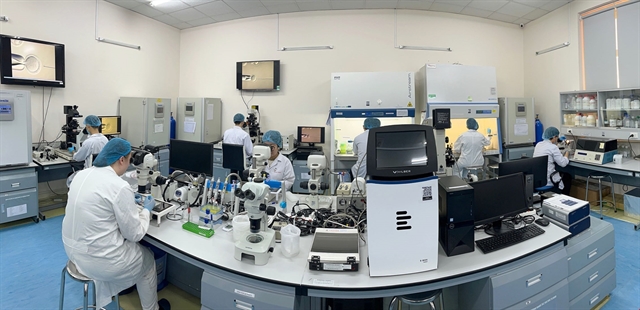 Society
Society

 |
| Workers at a biotech laboratory of the International University under the Việt Nam National University HCMC in HCM City.— VNA/VNS Photo Thanh Vũ |
HÀ NỘI — The Ministry of Science and Technology has officially unveiled a list of 21 major challenges in the fields of science, technology, innovation and digital transformation.
As part of newly-issued Decision 1144/QĐ-BKHCN, the move marks a pivotal step in the ministry’s effort to realise objectives set out in the Politburo's Resolution 57-NQ/TW, aimed at driving national breakthroughs in science, technology, innovation and digital transformation in the digital era.
The list of challenges offers concrete proposals and serves as a call to action for Việt Nam’s community of science and technology enterprises to collaborate in shaping the country’s digital future.
The challenges span a broad spectrum of critical domains, including artificial intelligence (AI), the Internet of Things (IoT), biotechnology, next-generation telecommunications (5G and 6G), semiconductors, blockchain, big data, space technology and other cross-disciplinary areas.
Each grand challenge arises from real-world needs and strategic national priorities, with strong potential for future application.
The grand challenges are not only reference frameworks to guide investment, but also concrete mandates assigned to specific agencies and tech enterprises in Việt Nam.
They aim to lay the foundation for the development of core technologies under the Vietnamese brand.
Notable examples include the development of a national biological data platform integrated with AI for research, development and commercialisation of biotechnology products in Việt Nam; research and manufacturing of 5G and 6G equipment alongside core network and transmission ecosystems; the establishment of a high-tech, small-scale semiconductor chip factory for research, training and production of specialised chips; the creation of 'Make in Việt Nam' AI models, including a large language model using Vietnamese language with at least 100 billion parameters, applicable across finance, law, agriculture and culture; and the investment in an 80MW cloud computing centre owned and operated by Việt Nam to help build national data infrastructure.
Each challenge has been assigned a specific lead unit, demonstrating the ministry's meticulous approach to implementation and its strong commitment to advancing meaningful innovation.
Change in approach
The announcement is widely seen as a marked shift in approach, with the State now setting the direction while businesses take the lead in execution.
No longer limited to purely academic research programmes, the grand challenges directly address market needs and real-world applications, with the ultimate aim of delivering breakthrough, viable and commercialisable technologies and services.
Examples include challenges involving the application of AI and IoT to monitor animal health, trace disease outbreaks and optimise the livestock-veterinary supply chain, development of digital platforms and smart sensors to support sustainable aquaculture, and the creation of a digital management and monitoring system for national forest resources using remote sensing and AI.
Further challenges include the research and development of AI and IoT-based digital platforms to preserve the freshness of post-harvest agricultural products to meet export standards, development of bio-additives and eco-friendly concrete materials for coastal and island infrastructure, low-Earth orbit satellite manufacturing and development of AI virtual assistants for civil servants.
The ministry tasked Vietnamese digital technology enterprises with actively engaging in research, mobilising resources and seeking solutions to the grand challenges.
It encourages agencies under the ministry to coordinate, support and facilitate effective enterprise participation.
This open mechanism reflects a highly interactive and flexible model of collaboration between the State and the private sector, one that genuinely empowers businesses to contribute to the nation’s development trajectory.
Minister of Science and Technology Nguyễn Mạnh Hùng said that science, technology, innovation and digital transformation are key drivers of Việt Nam’s leapfrogging development in the era of the Fourth Industrial Revolution.
Strategic sectors such as AI, biotechnology and renewable energy are not only vital to the country’s sustainable growth but also represent opportunities for Việt Nam to establish itself on the global science and technology map.
The efforts will generate greater economic value, help the country overcome the middle-income trap and progress towards its ambition of becoming a high-income nation, he said.
With the release of the challenges and a strong spirit of partnership with technology enterprises, the ministry has opened the door to a new chapter of digital transformation, innovation and sustainable national development. — VNS